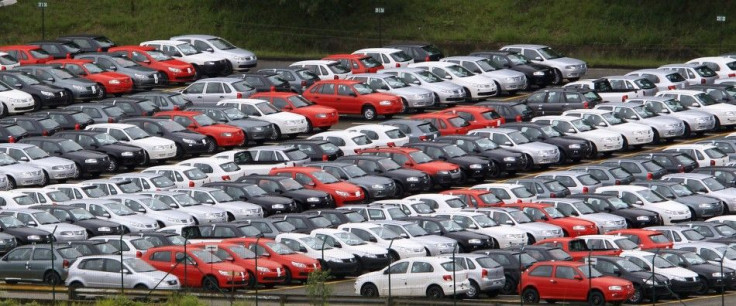Fuel-Efficient Cars Drive Auto Sales Higher in March

March auto sales are expected to reach their highest levels since 2007, driven by increased consumer confidence, demand for fuel-efficient cars and redesigns of popular models like the Toyota Camry and Honda Civic, according to recent industry reports.
Sales are expected to reach 1,425,000 units in March, for an annualized selling pace of 14.6 million, Kelly Blue Book said. That would represent a 24 percent increase from February and 14 percent gain from March 2011. March is a historically strong month for car sales as consumers use tax refunds to purchase cars.
Conditions in the economy have generally been positive through the first few months of the year, and if conditions remain steady, the industry can expect to see continued strength in sales for the months ahead, said Alec Gutierrez, a KBB senior market analyst.
Gutierrez added, however, that rising fuel prices could slow down the current momentum in sales growth if left unchecked.
Auto sales this quarter have already improved 8.7 percent over the fourth quarter of 2011, the result of gains in consumer and investment spending, according to a report by Deutche Bank, on Friday.
This is the fifth time since 1990 the quarterly change in car sales exceeded 8 percent, and sales were artificially inflated by temporary incentives on two of those occasions -- the 2009 cash for clunkers program and the 0 percent financing incentives following 9/ 11. In the current period, there are no such incentives boosting sales; and U.S. automakers are continuing to recover from a severe slump that forced GM and Chrysler to file for bankruptcy in 2009.
Volkswagen AG is expected to post the biggest year-over-year gains in March, driving sales up 38.7 percent, according to KBB. Close behind, though, are Chrysler Corp. and General Motors Co., which are expected to increase sales 34.7 percent and 24.1 percent, respectively. Ford, Toyota, Honda, Nissan, Hyundai and Kia are all expected to post gains as well.
Fuel-efficient cars are selling particularly well in March as gas hit an average price of $3.80 per gallon nationally. Compacts and hybrid cars are expected to benefit the most from rising gas prices, and 51 percent of respondents told KBB they were considering smaller, more fuel-efficient cars and 20 percent were considering alternative-fuel cars.
New subcompact cars like the Ford Fiesta, Hyundai Accent and Chevrolet Sonic are driving sales in combination with already established, popular sub-compacts like the Honda Fit, Toyota Yaris and Nissan Versa, KBB said.
The number of small car models on the market has increased 37 percent since 2007.
Toyota and Honda are both expected to see continued, significant gains in market share, KBB said. Toyota vehicles accounted for 13.9 percent of sales in February, up from 10.2 percent in 2011, and Honda reached 9.6 percent, up from 7.6 percent. Toyota's continuing gains are expected to be driven by the redesigned Camry and the Prius family of vehicles, while Honda will be looking to the redesigned Civic and CRC to continue bolstering its sales.
Increased sales in March may also be driven by improving inventories following the fourth quarter of 2011 when more than one-quarter of consumers surveyed by KBB said they had difficulty finding the specific cars they wanted.
Not only have inventories improved, but cars are also getting sold faster, according to market research firms J. D. Power and LMC Automotive, which predicted new auto sales will be 7 percent higher in March compared to a year earlier.
Sub-compact and compact cars, which account for 23 percent of sales in the U.S., remained on lots for 17 and 46 fewer days, respectively, in March compared to the industry average a year earlier. Full-size pickup sales, though, are languishing as the vehicles have stayed on lots 11 days longer than in 2011, J. D. Power said.
Despite the strong March sales, KBB said it expects the seasonally adjusted sales rate will fall short of February's rate of 15.1 million.
Sales in February were aided by unseasonably warm weather across the United States and an additional selling day due to the Leap Year, triggering a strong seasonally adjusted sales rate that will not likely repeat this year, Gutierrez said.
Although March's strong sales are expected to continue into the summer, some industry watchers believe milder weather may have brought potential car buyers out earlier than usual.
Did people just get out earlier, or will there just be more people out for the year? asked Paul Taylor, chief economist for the National Automotive Dealers Association. We probably won't know until May.
The vigorous start to 2012 suggests that there is further upside potential if the current pace continues through the summer months, said Jeff Schuster, LMC's senior vice president of forecasting.
© Copyright IBTimes 2024. All rights reserved.





















